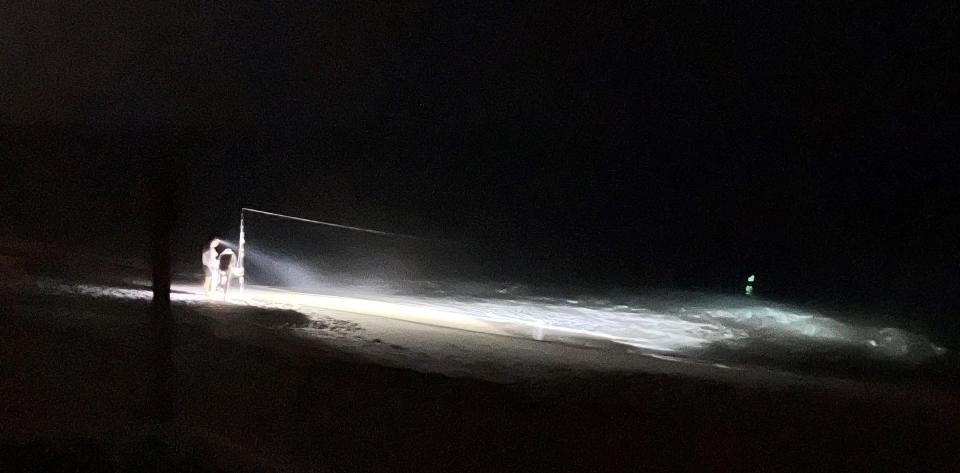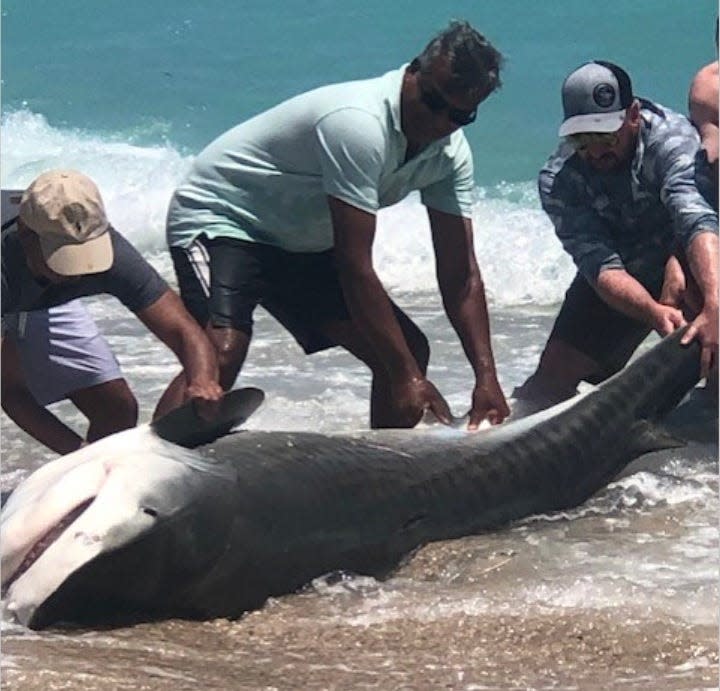Florida shark fishermen clash with beachside owners and swimmers over chumming, blood baiting
Shark fishermen sling bait — sometimes even blood — to lure the ocean's top predator near the same surf where children splash around like prey and most shark attacks occur. For some, that casts much doubt on the surf's safety.
To ease those worries, Florida in 2019 banned shark chumming from the beach and required a free shark fishing course that teaches, among other safety tips, to fish far away from swimmers. But some say those and other stricter shark fishing rules that took effect in 2020 are not enforced or simply nudged more fishermen into remoter areas such as Brevard County's south beaches. There, next to the Archie Carr National Wildlife Refuge, they can flout fishing regulations and other rules, such as using bright lights at night during sea turtle nesting season.

Others say that when some towns closed their beaches during the COVID-19 pandemic, out-of-town fishermen discovered some of the more remote public beach accesses that remained open, such as the narrow dirt strip in Indian River Oaks in south Brevard that often crowds with out-of-town shark fishermen these days.
"I've probably called the police 50 times in 8 months," said Dr. Neal Abarbanell, of Indian River Oaks in south beaches. "I'm begging someone in our government to step up and help us."
That help never came from state or local law enforcement, Abarbanell and his neighbors say. So despite the stricter 2020 shark fishing rules, they continue to endure the very conflicts those rules aimed to avoid. Then on June 7, three shark attacks less than two hours and five miles apart in the Panhandle rekindled the continual calls from some charter fishermen to thin the shark herd. They've long-argued that too many sharks steal catches right off their hooks, hurting business; and they blame the recent attacks on shark population growth.
But biologists say shark attacks remain incredibly rare, most shark species are far from thriving, and that frequent shark thefts from fishing lines are a symptom of much deeper ecological ills, not more sharks.
"They don't realize that without sharks, there won't be other types of fish," said Toby Daly-Engel, an associate professor at Florida Institute of Technology and director of FIT's Shark Conservation Lab. "What they don't realize is that depredation is picking up because sharks have figured out that there's not a lot of food anywhere else."
Sharks typically swim within 100 feet of shore, but research by the Florida Museum of Natural History found that most shark attacks happen within 10 feet of shore, mostly 'nip-and-runs' by very small sharks.
But what the baiting fishermen do near the surf can increase risk of attacks from larger sharks, fish biologists say, especially tiger sharks hunting their usual meal of sea turtles.
Fishermen also catch and release injured fish and small sharks from shore, tempting bigger sharks with the easy meals.
Three attacked by sharks in one day
On June 7, three people were severely injured in shark attacks less than two hours and five miles apart in Florida’s Panhandle. The attacks weren't linked to surf fishing but brought those concerns to the forefront and the usual calls to cull sharks.
Before that day, the area of the attacks, Walton County, was one of three Florida counties with only one unprovoked shark bite recorded in International Shark Attack File in the past 140 years. At about 1:20 p.m. that day, a 45-year-old woman was swimming with her husband past a sandbar near Founders Lane in Watersound Beach, west of Seacrest Beach when she was bitten.
Then, at just before 3 p.m., two girls ages 15 and 17 were swimming with friends in waist-deep water near the Sandy Shores Court area of Seacrest Beach, about four miles east of the first bite, the Pensacola News Journal reported. The girls were swimming just inside the first sandbar, authorities said, similarly close to shore as in the previous attack.
The mother of one of the teens said the girl's hand had been taken and her right leg had to be amputated.
Parents fret bold surf fishermen with multiple poles

Abarbanell is furious about the nuisances shark fishermen create near his south beaches home and that prevent his 3-year-old daughter from being able to play safely in the surf. They chum, block the beach with multiple poles, fish at night with bright lights, and otherwise annoy and threaten the neighborhood, he said.
He got so fed up that he briefly jumped into the Brevard County Commission race, solely to try to put a stop to it. He recently dropped out of the race in frustration that he wouldn't likely be able to change anything.
Three shark attacks in one day: How can you avoid being bitten by a shark? What to know before swimming in Florida waters
Several years ago, just up the beach from where Abarbanell lives, former Melbourne Beach Mayor Jim Simmons was chief among those lobbying state officials for the beach-chumming ban.
Then in 2019, Florida banned "chumming," or "blood baiting" from shore due to the danger of potentially putting sharks into feeding frenzies near swimmers. The Florida Fish and Wildlife Conservation Commission defines chum as "fish, fish parts, other animal products, or synthetic products created or intended to chemically or otherwise resemble animal products placed in the water for the purpose of attracting a marine organism."
Chumming is "not permitted when fishing for any species from the beach or when wade fishing in waters adjacent to a beach," FWC officials said via email. It is allowed elsewhere, though, including from piers or from a vessel.
Grant Gilmore, a senior scientist at Estuarine, Coastal and Ocean Science Inc., Vero Beach, said that two fatal and one near-fatal tiger shark attacks that he knows of on the most popular beach in Vero (Jaycee Park) have him very concerned about chumming in the area.
"Tigers can swim long distances in a very short time," Gilmore said. "The 'Tiger Beach' tigers being fed by humans in the Bahamas are only a couple of days swim from east Florida. They associate humans with food now that we have conditioned to feed from humans."
Feeding fish, sharks or other marine species while diving or snorkeling is prohibited in Florida.
But even boat motors can attract sharks from afar. "They're very sensitive to sounds, and outboard motors produce a lot of sound," Gilmore said. "They could be a dinner bell."
People need to use the same common sense that applies to feeding bears and other wildlife, he added.
"We have so many more people in Florida, and so many people with machismo that want to catch a shark in Florida," Gilmore said. "Don't feed the sharks. You don't feed the alligators, do you? If you feed these guys, they're going to associate you with food and they might not differentiate between what you're going to give them and you."
But the chumming still churns along near Indian River Oaks, as Abarbanell and some of his neighbors attest, tempting the tigers and other sharks.
"It's an unbelievable situation but this is what's going on with us, and we are begging for help from our government," he said. "The only real solution is to move."
Fishing, wildlife or boating violations can be reported to the Wildlife Alert program at 888-404-3922.
Florida Fish and Wildlife Conservation Commission tips for lowering risk of shark attacks include avoiding waters used for any type of fishing, especially if there are signs of baitfish or feeding activity. "Diving seabirds, which frequently feed on baitfishes, are good indicators of such activity," FWC says.
Contact Waymer at (321) 261-5903 or jwaymer@floridatoday.com. Follow him on X (Twitter) at @JWayEnviro.
This article originally appeared on Florida Today: Shark fishing in Florida: Have stricter rules made beaches safer?

